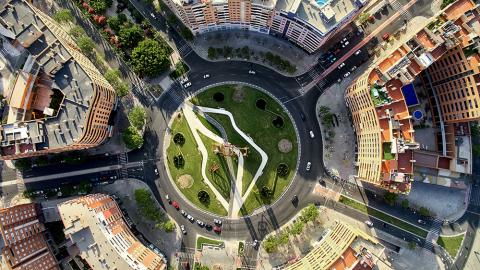Circular Economy Innovation opportunities for businesses
The meeting is addressed to the companies that want develop the dynamics of the Circular Economy.
The aim is to help the companies to implement the processes and dynamics that will enable the development of Circular Economy, and to apply them on their regions, share experiences and further spread the idea of sustainable competitiveness.
The meeting on 19 February is an important occasion in order to raise awareness among communities, accept needs in terms of innovative skills, in a circular economy perspective. The meeting will also offer the opportunity for participants to find out about upcoming project initiatives.
More information can be found here: https://www.fg.camcom.gov.it/node/3923
Second meeting of the National Committee on Circular Economy-Focus on the training procedures and the Roadmap timeframe
The second meeting of the National Committee on Circular Economy took place on 7th February 2020 and was chaired by the General Secretary of Natural Environment and Water, Dr Aravosis. In line with the position of the Ministry for the Environment and the Energy, Dr Aravosis described the training procedures and the timeframe for the Roadmap on Circular Economy as well as the Specific Business Plan for the implementation of the Single-Use-Plastic Directive through a wide social dialogue that takes into consideration the opinion that is submitted by all participating entities.
During the meeting information was also provided on how the National Action Plan is going to promote the Green Public Procurement.
Other proposals were put forward in relation to the drawing of a Plan on Industrial Living, elaborating measures to stimulate the secondary materials market, linking Climate Change and Circular Economy, and adopting cyclicality criteria in products and operations. More specifically, the discussion was focused on the specific categories of products (Plastics, Foods, Bio-waste, Clothing) as well as sectors (Islands, Tourism), elaborating a number of institutional arrangements for the de-labeling of waste, sludge recovery, wastewater recycling, of treated biological water, as well as financial incentives to support green growth and the Circular Economy.
Finally, it was decided to set up supportive individual Working Groups, involving representatives of stakeholders and to further organize individual thematic meetings, to promote the Circular Economy. Prt of the scope of these groups will be business incentives, monitoring indicators, information initiatives, specialized sector policies, funding tools and the creation of an Observatory for Circular Economy to monitor its progress.
More information found here: https://www.voria.gr/article/ethniko-simvoulio-kiklikis-ikonomias-apofasis-gia-ton-odiko-charti
This is how Europe is opening the floodgates to ‘green’ money
The European Commission launched on Wednesday (6 February) a consultation with member states, the European Parliament and other stakeholders to review the EU’s fiscal rules, the Stability and Growth Pact.
The review comes as part of a multi-front effort to channel billions of euros into making the European economy more sustainable and achieving the zero-emission goal by 2050.
The aim is to simplify a set of rules considered “too complex” and based on “non-observable” indicators, said Commission vice-president Valdis Dombrovskis.
More information found here: https://www.euractiv.com/section/economy-jobs/news/this-is-how-europe-is-opening-the-floodgates-to-green-money/
Europe plans to harness ‘power of data’ in support of Green Deal
The EU Green Deal needs “digitalisation as an enabler for decarbonisation” in all sectors of the economy, including transport and energy, the European Commission says.
The digital decarbonisation plan is part of wider policy proposals aimed at making “Europe fit for the digital age”. And while the plan is still subject to change, it does give a clear indication of the Commission’s intentions.
More information found here: https://www.euractiv.com/section/energy-environment/news/europe-plans-to-harness-power-of-data-in-support-of-green-deal/
Towards a sustainable economy: How to make the circular economy a ‘business model’ for the EU
By 2050, the global municipal solid waste generation is estimated to rise to 3.4 billion tonnes per year, compared to the current 2.1 billion tonnes, according to data from the World Bank. This increasing amount of garbage and diminishing resources available at a global scale pose a challenge for European politicians, society and industry alike. The reduction of single use plastic, such as bags or straws, is in particular a major public concern.
EURACTIV organised this high-level Stakeholder Workshop to discuss the EU’s circular economy policy, its current challenges and its future steps.
For more information click the following link: https://www.euractiv.com/section/circular-economy/video/towards-a-sustainable-economy-how-to-make-the-circular-economy-a-business-model-for-the-eu/
The European Investment Bank launches its Circular City Funding Guide
Circular City Funding Guide (https://www.circularcityfundingguide.eu/) was launched 31 January 2020 at the Cities Forum in Porto, Portugal.
The guide provides information and support on funding and financing of the Circular Economy in an urban context. It was initiated as one of the actions under the Urban Agenda Partnership for Circular Economy and developed by external service providers and EIB experts involved in and funded by the European Investment Advisory Hub, a partnership between the European Investment Bank (EIB) and the European Commission.
The guide has two main target groups: fund-seekers and funders of circular projects in cities. Fund-seekers can be local governments, businesses, and other actors that are active in urban contexts. Funders can be financial entities as well as public authorities that aim to set up a funding programme for circular projects.
The European Investment Bank launches its Circular City Funding Guide
Circular City Funding Guide (https://www.circularcityfundingguide.eu/) was launched 31 January 2020 at the Cities Forum in Porto, Portugal.
The guide provides information and support on funding and financing of the Circular Economy in an urban context. It was initiated as one of the actions under the Urban Agenda Partnership for Circular Economy and developed by external service providers and EIB experts involved in and funded by the European Investment Advisory Hub, a partnership between the European Investment Bank (EIB) and the European Commission.
The guide has two main target groups: fund-seekers and funders of circular projects in cities. Fund-seekers can be local governments, businesses, and other actors that are active in urban contexts. Funders can be financial entities as well as public authorities that aim to set up a funding programme for circular projects
Circular economy – new action plan to increase recycling and reuse of products in the EU
In its recent Communication of December 2019 regarding the European Green Deal, the Commission committed to adopt a new Circular Economy Action Plan in order to accelerate and continue the transition towards a Circular Economy. The Commission plans to adopt the Action Plan together with the Industrial Strategy in order to mobilize the industrial sector and all the value chains towards a model of sustainable and inclusive growth, ensuring efficient and clean resource cycles.
The European Green Deal further highlights the potential of a Circular Economy for new economic activities and jobs. Based on the Circular Economy Monitoring Framework already 4 million people work in Circular Economy related activities. That number has increased since 2012 by 6%. Furthermore, these activities generated almost EUR 147 billion in value added in 2016. According to the Commission, the new action plan will reinforce these positive trends.
The new plan will contribute to increasing the circularity of the EU’s economy, preserving its natural environment and supporting the contribution of the EU’s industry to achieve a climate-neutral continent. It will stimulate markets for climate-neutral and circular products and services, modernise the EU’s economy and reap the benefits of the transition in the EU and beyond. The Commission considers that there is a lot needed to move away from a linear economy and mitigate its associated impacts on the environment, for example in terms of biodiversity loss and climate change.
The new Circular Economy Action Plan is expected to be published in the first quarter of 2020. On 6 January of this year the Commission invited all stakeholders to provide feedback on the relevant roadmap (https://ec.europa.eu/info/law/better-regulation/initiatives/ares-2019-7907872_en). The process closed on 20 January 2020.
Circular economy – new action plan to increase recycling and reuse of products in the EU
In its recent Communication of December 2019 regarding the European Green Deal, the Commission committed to adopt a new Circular Economy Action Plan in order to accelerate and continue the transition towards a Circular Economy. The Commission plans to adopt the Action Plan together with the Industrial Strategy in order to mobilize the industrial sector and all the value chains towards a model of sustainable and inclusive growth, ensuring efficient and clean resource cycles.
The European Green Deal further highlights the potential of a Circular Economy for new economic activities and jobs. Based on the Circular Economy Monitoring Framework already 4 million people work in Circular Economy related activities. That number has increased since 2012 by 6%. Furthermore, these activities generated almost EUR 147 billion in value added in 2016. According to the Commission, the new action plan will reinforce these positive trends.
The new plan will contribute to increasing the circularity of the EU’s economy, preserving its natural environment and supporting the contribution of the EU’s industry to achieve a climate-neutral continent. It will stimulate markets for climate-neutral and circular products and services, modernise the EU’s economy and reap the benefits of the transition in the EU and beyond. The Commission considers that there is a lot needed to move away from a linear economy and mitigate its associated impacts on the environment, for example in terms of biodiversity loss and climate change.
The new Circular Economy Action Plan is expected to be published in the first quarter of 2020. On 6 January of this year the Commission invited all stakeholders to provide feedback on the relevant roadmap (https://ec.europa.eu/info/law/better-regulation/initiatives/ares-2019-7907872_en). The process closed on 20 January 2020.
Circular economy – new action plan to increase recycling and reuse of products in the EU
In its recent Communication of December 2019 regarding the European Green Deal, the Commission committed to adopt a new Circular Economy Action Plan in order to accelerate and continue the transition towards a Circular Economy. The Commission plans to adopt the Action Plan together with the Industrial Strategy in order to mobilize the industrial sector and all the value chains towards a model of sustainable and inclusive growth, ensuring efficient and clean resource cycles.
The European Green Deal further highlights the potential of a Circular Economy for new economic activities and jobs. Based on the Circular Economy Monitoring Framework already 4 million people work in Circular Economy related activities. That number has increased since 2012 by 6%. Furthermore, these activities generated almost EUR 147 billion in value added in 2016. According to the Commission, the new action plan will reinforce these positive trends.
The new plan will contribute to increasing the circularity of the EU’s economy, preserving its natural environment and supporting the contribution of the EU’s industry to achieve a climate-neutral continent. It will stimulate markets for climate-neutral and circular products and services, modernise the EU’s economy and reap the benefits of the transition in the EU and beyond. The Commission considers that there is a lot needed to move away from a linear economy and mitigate its associated impacts on the environment, for example in terms of biodiversity loss and climate change.
The new Circular Economy Action Plan is expected to be published in the first quarter of 2020. On 6 January of this year the Commission invited all stakeholders to provide feedback on the relevant roadmap (https://ec.europa.eu/info/law/better-regulation/initiatives/ares-2019-7907872_en). The process closed on 20 January 2020.




